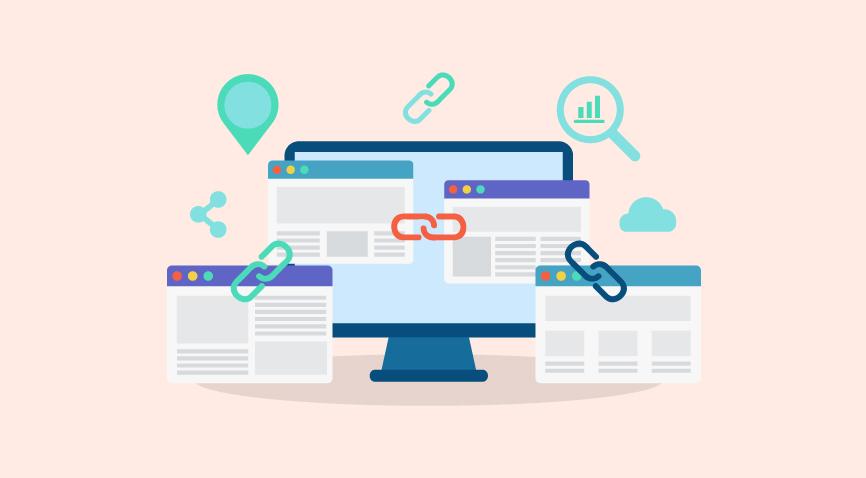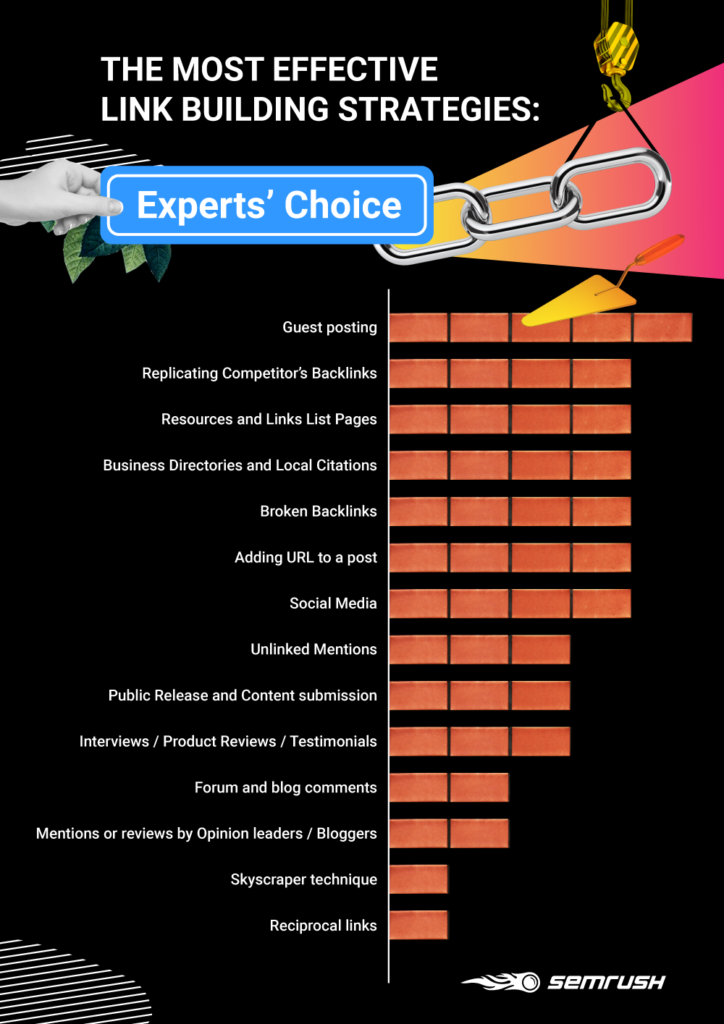
Table of Contents
- Introduction
- What Is Link Building and Why Does It Matter?
- White Hat SEO VS Black Hat SEO
- How Can Link Building Help Your Business
- How to Do Link Building In SEO[Ed2]
- Different Types of Links You Want and How to Build Them
- Key Takeaways
- Conclusion
- FAQs
Search Engine Optimization is a mix of marketing techniques that are used to increase the visibility of websites on the pages of search engine results. For most brands and businesses, this would mean getting on the first page or the first position in Google’s search results. A good SEO strategy consists of three pillars:
- Technical SEO: This will enable proper optimization of a website’s structure and code.
- On-page SEO: This has to do with everything involving a website’s content.
- Off-page SEO: Are actions taken outside of your website to impact your rankings within search engine results.
In this blog, we will explain link building, link building tips, strategies, and how it works.
What is Link Building and Why Does It Matter

Simply put, a hyperlink or link is building a connection between two different pages. Using a link, people can be referred to a blog post, a page, or other elements on the web. A link can help you move from one location of the web to another. Businesses and marketers should focus on link building to drive traffic to their websites. They must understand what is link building in SEO and how to do link building as it is very important for your brand and your website.
Search engines crawl links between individual pages on a website and links between other websites to determine a good link. When there’s a link to your site, there’s a signal sent out to Google that your site is a worthy source. So, the more backlinks you have, the greater the chance of earning a higher ranking from Google.
There are various types of link-building techniques that businesses and marketers can use. While each of them varies in complexity and difficulty, link building is one of the most difficult and time-consuming parts of SEO.
Link building plays a very critical role in SEO. You must understand what is linking well in advance before you go ahead with your SEO strategies. Links help search engines to find new pages on the web and also determine which of those pages should be ranked higher in SERPs. According to Google, “In general, webmasters can improve the rank of their sites by creating high-quality sites that users will want to use and share.” This means that when you use link-building strategies, you must focus on earning links as you’ve taken the trouble to create awesome content that users would like to share and not just use link-building for the search engines.
Apart from other factors like on-page content and SEO optimization, site loading speed, authority, and trust of a website, mobile-friendliness, and user experience, link building is a very important factor for Google.
White Hat SEO VS Black Hat SEO

Link building comes in two ways – a right and a wrong way. For the long-term performance of your website, you must focus on natural link building and follow Google’s guidelines.
White Hat SEO is a process where you use organic link-building strategies to better your site’s online visibility in the search results. These techniques are appreciated by Google, but would usually take a lot more time than the Black Hat techniques. White Hat SEO link building techniques include the following:
- Promoting your content
- Guest posting
- Building online relationships
- Creating infographics
- Commenting on authority blog posts and blogs
- Using business listings and website directories
When it comes to Black Hat SEO, these techniques are unethical practices that are used to rank your website in search engines. These Black Hat SEO techniques are not appreciated by Google and if Google finds that your Black Hat techniques violate the guidelines, there are chances that your website could be hit with a penalty. This can lead to a negative impact on your rankings, which could take a lot of time to get your SEO performance back and running. Some Black Hat techniques include the following:
- Link schemes
- Hidden links
- Keyword stuffing
- Doorway pages
- Abusing anchor text or structured data
- Anything spammy or malicious
How Can Link Building Help Your Business?
Link building makes a huge difference to your search engine rankings and that’s the reason you must include it in your SEO strategies. Over the years, how to do link building has changed to a large extent but it remains the main part of SEO strategies.
Apart from SEO performance benefits, link building also comes with several other benefits as well. Some of those benefits are mentioned below:
1. Brand building
When done correctly, link building can help with brand building. It helps you establish authority in your particular industry. If you’re looking to get your brand to the forefront then smart content marketing strategies and techniques like focusing on guest posting and quality content creation are important. Showing your expertise can go a long way into brand building. It helps you build an authoritative voice and you will be known as someone who publishes good content, and you’ll also be rewarded with inbound links.
2. Relationship building
Link building strategies may involve outreach to something you’ve created, relevant blogs or websites, a promotion, or an engaging infographic. While the main idea of outreach is to gain links, outreach can also help your brand build long-term relationships in your industry. These relationships can build your network, your brand, and also build authority. You must therefore understand link-building tips like these as they play a very important role in not only SEO but also other aspects of your brand.
3. Referral traffic
Good links from highly-visited websites can earn you not only link juice but also lead to an increase in your traffic. If you link to websites that seem relevant to your site, then there’s a higher chance that their website traffic is relevant too. This doesn’t apply to only high-traffic websites but also small, passionate audiences from relevant blogs are far better than reaching a wider, general audience.
4. Higher sales opportunities
Referral traffic that comes in from relevant websites often leads to potential customers, which can then lead to more sales opportunities. A boost in your rankings comes with link building but also from referral traffic that you’ve received from various types of links. So, this means, you can sell more services and products and also generate revenue from new avenues.
How to Do Link Building for A Website

Although link building is not very easy to do, here are some simple White Hat SEO techniques that will show you how to do linking building in SEO. You can begin implementing these techniques right away without any additional expense or a lot of effort.
1. Ask for backlinks
If you are just starting or a beginner then asking for backlinks is one of the best things to do. Consider talking to friends, colleagues, clients, or partners that have websites or blogs. All you need to do is simply ask them for links in the content. This is better than asking for links in the footer or sidebar instead. However, ensure that your backlinks come from a relevant website. Getting links from non-relevant niches will not have a great impact and may sometimes be harmful.
2. Give a testimonial
Testimonial link-building strategies are one of the best link-building tips you can use. Some businesses and brands offer you a chance to give testimonials about certain services or products you use. While it’s a great way for them to build customer trust, it’s also a perfect opportunity that you can use to get potential traffic and backlinks from that website. It’s a win-win situation, where brands get another great testimonial to add to their website while you win new backlinks.
3. List your website in trustworthy directories
You may find various online directories that provide absolutely no value to users and these directories are excluded from Google’s search results. Surely, you do not want your site to be listed on these directories. Directories that allow you to post links to your website or give useful information to your potential customers are trustworthy directories.
4. Write a good guest post
You will find many blogs and websites that are ready to publish your pieces and articles on their websites. However, before you go ahead and write a guest post, keep in mind the following points:
- The blog or website is relevant to your niche or topic
- Focus on well-written, interesting, and professional content
- The post should NOT be about how great your brand or company is
- Keep in mind that a poorly-written article can get you a bad reputation.
5. Start a blog
When it comes to important link-building tips then starting a blog is a great idea. Avoid making a blog with just one post and one backlink. You need to stay consistent and keep your blog alive. Ensure that you create posts regularly. Focus on your customer’s needs and your industry. Things like this can take time, but the idea is to stay patient and you will eventually gain authority. Also, make sure that all your content is useful, well-structured, and relevant. It’s only when you have good, relevant content, will the world want to link to it over and over again.
6. Discover your competitors’ backlinks
Most beginners are always wondering how to do link building using the best techniques. One of the best link-building strategies to use is to discover your competitors’ backlinks. Research is very important when you practice link building in SEO. When you research your competitors, you will find that they may have some common backlinks which you may not have as yet. So, if they have those backlinks, then why don’t you? Analyze those backlinks and try to get them too.
7. Recover dead backlinks
Sometimes you may notice that there are a few broken links to your site. This could happen if your page location changes or if someone misspelled your link. In both instances, you will get a 404 error. This issue can also happen after a website is re-launched or migrated to some other domain. You must take care of this and redirect those backlinks to your page.
8. Turn mentions into backlinks
This is one of the simplest things you can ever do when it comes to link-building tips. Let’s say, someone has already written something about you and mentioned your product or brand, but has not linked it to your site. In such situations, you can contact the person and ask them to convert the mention into a backlink.
9. Use Infographics
No matter how good your content or writing is, some people find it much easier to grasp information when it’s presented pictorially. Remember, people grasp information in different ways, so your message or content must be put out in a way that can capture the attention of all types of audiences. Use infographics to get or attract links as this can work well to attract visitors to your website.
10. Case studies and research reports
Personal opinions are valuable and interesting especially if you’ve been in a particular industry for a very long time. However, if you’re looking to gain authority and earn backlinks, it’s important to show statistics and facts. This is one of the main reasons why most shareable contents are case studies, research papers, comparisons, and reviews. Fresh and new content is very important in any type of industry. Therefore, always try to be the first one to write relevant and up-to-date content about a particular topic. Include test results, charts, relevant data, and make sure to link your sources.
11. Reuse content
Reusing content is another interesting way to gain backlinks. Get the most out of every single piece of content you create by reusing your old content to create different formats like videos, guides, infographics, transcripts, webinars, and podcasts. When it comes to marketing, there are plenty of creative ways to create awesome content. When you use different formats, you will be able to generate more leads and increase authority as well.
12. Newsletter subscriptions
Businesses do not understand the importance of newsletters. If used in the right way, you can get a lot of great benefits. Publishing newsletters can help build awareness and increase the attention of your clients or readers. With interesting and quality content, there’s a higher chance of your content being shared and thus, increasing the number of backlinks and traffic.
Different Types of Links You Want and How to Build Them
Here are the different types of links you must try to earn for your clients or business, including some tips on how to build and earn them.
1. Edu links
Educational websites tend to have very high authority, making them valuable. To earn media links, you can try to get students to write guest posts (ideally students who are studying your niche or industry) and encourage them to try and share the post with classmates or teachers. You could also consider giving them a discount.
2. GOV links
Just like educational links, government links also tend to have high authority. To earn these links, you can focus on helping veterans of the armed forces. You can also offer them training, discounts, or scholarships.
3. ORG links
These websites come with the same benefits as educational websites and government websites. However, these are easier to gain. You can try to sponsor a charity program or offer your products or services.
4. Editorial links
These types of links happen naturally. They happen when you put out engaging and high-quality content. Chalk out a powerful content marketing strategy to earn these links.
5. Links from traditional press or media
Another great way to gain links is to get them from the media and press. These could be magazines, radio, TV, and newspapers. You can create a study or resource that you think journalists may cite.
6. Internal links
This is another easy link-building technique to use for your brand or business. It’s simply about linking one page to another on your website. They help Google to understand and rank your site better.
7. Links from complementary businesses within your industry or niche
Complementary businesses usually come with the same target audience and they are not directly competing with you. To gain links, you can try and write reviews for their services or products, write guest posts for each other, or build a marketing campaign together.
8. Links from your competitors
When you get your competitors to link you, then you know that you’re moving in the right direction. Do in-depth research or create job boards that provide valuable information that they just can’t help but have to link to it.
9. Social media profile links
If your websites have not yet been added to your social media profiles then it’s time to do it right away. This may seem like a simple step, but it’s often missed because there are way too many social media platforms. Check if you’ve added your profile on popular social media platforms like Instagram, Facebook, LinkedIn, Twitter, Goodreads, Snapchat, Tumblr, Reddit, Flickr, Pinterest, Periscope, and Quora, including any other platform where you are present.
10. Niche forum profile links
These niche forum profile links include the audience that is highly involved in your particular industry or niche. So, search for the popular niche forums in your industry where you can start engaging with the audience. The tip is to offer valuable information first and then start sharing after giving them sensible links.
11. Social media post links
You must ensure that you keep posting content to your social media channels consistently. You can make use of tools like Hootsuite and Buffer to schedule your content to keep driving traffic.
12. Links from ebooks
Writing an ebook and then adding a link to it is another great way to go about link building. You can easily turn all your blog posts into an ebook to drive in traffic.
13. Links with brand name anchor tags
If you see that your brand is talked about or listed somewhere then go ahead and ask for a link. Make use of Google Alert and set alerts for brand mentions. Reach out whenever you find out that someone has mentioned your brand.
14. How-to guide links
Is there a process or topic that you’ve spent a lot of time perfecting or researching? Publish a how-to guide or resource for people in the same industry or niche. Think about this – if you’ve been searching for a good resource then there’s a high chance that others are looking for it too.
15. Links from Q&A sites
Get onto sites such as Quora and give answers to questions to get recognized. The key here is to offer valuable information and not simply search for different places to drop in your links.
16. Graphic links
Anytime you notice that your brand logo shows up anywhere online, then make sure that you ask for a clickable graphic that has a link to your website.
17. Links from videos
After Google, YouTube is the second largest search engine, so make sure to go ahead and use it to your advantage. If you are uploading any video on YouTube then ensure that you have embedded, clickable links.
18. Links from reviews
Another link-building tip to use is to get in touch with influencers and bloggers in your niche and ask them to try your services and products and write a review about them. Some will do this in exchange for products or some of them may charge you for it.
Key Takeaways
- Businesses and brands need to understand what is link building strategy and why it is important in SEO.
- Link building consists of two ways – White Hat SEO and Black Hat SEO. White Hat SEO is about following proper Google guidelines and Black Hat SEO involves following techniques that are not approved by Google. Following Black Hat techniques can sometimes lead to penalties and also damage your rankings in a big way.
- The benefits of link building are not only about search engine rankings but also help with brand building, relationship building, referral traffic, and higher sales opportunities.
- There are various ways you can use link building for your website. These include asking for backlinks from people you know who have a blog or website.
- You can also gain backlinks by starting a blog, giving testimonials, listing your website in trustworthy directories, writing a good guest post, discovering competitors common backlinks, recovering dead backlinks, turning mentions into backlinks, using infographics, using case studies and research reports, reusing content and newsletter subscriptions.
- Explore strategies to use for gaining links from different types of websites like government, educational, and organizational websites. Trying to gain links from these websites proves to be helpful for your business.
Conclusion
You must assess the situation and see what’s more important for you. Are you looking to build links fast or do you want to create your process of getting links in-house? If you go with the first option, then you need to calculate the total number of links you want to build, estimate the budget, and then find a good agency to help with it.

FAQs
There are many different components when it comes to an effective SEO strategy and backlinks are certainly an important part of search engine rankings. Each link that points to a particular website gives a signal to Google that the website is trustworthy. Hence, the more websites that point to you and the greater the quality of those websites, the better.
One of the best ways to earn valid links from authoritative media websites is to focus on creating great content that ties in with your niche or brand. Your content strategy must be paired with relationship-based outreach approaches to connect with the right people. If you’re a beginner, you can simply use the ‘ask for backlink’ techniques to get links to your site. Ask friends, clients, or colleagues who may already have a blog or website for backlinks.
Some of the link building mistakes to avoid are creating poor quality content, using one type of link alone, linking to the homepage alone, trading of links, getting links from poor quality websites, and lack of diversity in your anchor texts.
Some examples of link-building strategies are to use strategic guest blogging, give testimonials, get active on social media, use resource links from trusted sites, grow your brand, and check competitors’ backlinks.
You’ll need the help of other bloggers and website owners to link to your content and help you grow. You can ask for backlinks by creating a valuable resource to link to, build a give-and-take relationship, replace outdated resources, find repeat sharers, and turn mentions into backlinks.
If you’re receiving links from unrelated pages or websites then they will be regarded as bad links. If it’s unrelated to your niche then it’s taken as a bad link.
Latest Blogs
Explore how Google’s 2025 AI search updates triggered ranking chaos. Learn actionable strategies to adapt your SEO for AI Overviews, zero-click searches, and SERP volatility. Stay ahead now.
Learn how to rank on AI search engines like ChatGPT, Perplexity, and Gemini by optimizing your content for authority, structure, and relevance. Stay ahead in AI-driven search with this strategic guide.
Explore the best healthcare SEO services for your medical practice. Improve online visibility and effectively reach more patients in need of your services.
Get your hands on the latest news!
Similar Posts

Artificial Intelligence
6 mins read
The Role of AI in Digital Marketing: AI Article Generators Transforming Content Creation

Artificial Intelligence
4 mins read
How AI Content Creator Is Shaping the Future of Digital Content

Digital Marketing
3 mins read